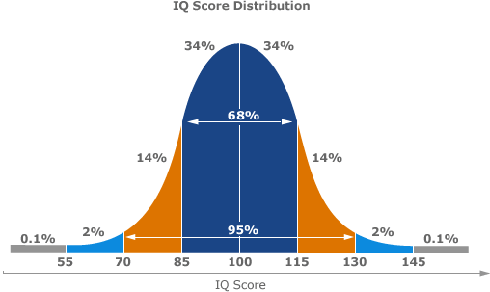On IQ and it's meaning.
What is IQ?

According to Wikipedia:
An intelligence quotient (IQ) is a total score derived from several standardized tests designed to assess human intelligence.
Everybody's head of it, most people are interested in it, and a lot have taken a non-legit test on the internet. But surprisingly the majority of people don't know much about it. Of course IQ is not the be all end all life score that some make it out to be, but it is one of the best intelligence evaluation ratings.
With that said if you're genuinely curious, are planning to take one, or are just validation needy and want to make sure you're better than others people (like myself), let's get into the meat of things.
What does IQ measure?

Originally IQ tests have started (and still are to a certain extent) as a tool for measuring a person's mental age, the higher IQ you have the more advanced your cognitive capabilities, such as
- Reasoning
- Long and short term memory
- Logic
- Information processing
- Accurate decision speed
- etc.
are for your age. Today it still serves a similar purpose, but it has evolved in such a way as to display a person's standing in regards to the rest of the population.
What IQ doesn't measure?
Make no mistake, although people with significantly higher IQ will generally be 'smarter' than those with average one, things such as getting higher grades, sense of humor, having meaningful discussions and vague concepts as "being successful" are obviously influenced by numerous other factors.
IQ will not measure a person's knowledge pool, social skills, and often life status. Although IQ does not directly influence income there is a correlation between people with high IQ and higher income.
However even that's not linear, meaning that having high IQ (115-130) statistically gives you a better chance to get some of that sweet-sweet money, but progressing higher (130+ IQ) does not statistically increase your amount of income or chances of having one.
Note: The next sections will not be sugar coated (at least not so much), please do not take offence to any of it, this is purely what my research wielded.
Some facts you should know.

- You can find people with high IQ in any profession and walk of life, in contrast people with lower IQ will generally not be in cognitive challenging jobs.
- In theory the amount of people with high IQ is the same as those with low one.
- Northeast Asians generally score higher than Europeans.
- Overall men score slightly (a couple of points) higher than women.
- Although it's still debated whether IQ is genetic, most research agrees that nurture and environment play a huge role in people's intellectual development.
- Unless suffering from a mental illness, IQ scores can be raised (people can become smarter, can't they).
- Since the brain is not fully developed until a person's early 20's it's best not to judge an adult based on a test done during teenage years or adolescence.
- Mensa is the most famous high IQ society which accepts people above the 98th percentile - 132 IQ on the Stanford–Binet scale (more on this below).
- There are theories which state that listening to classical music will improve IQ scores, this should be taken with a grain of salt since those theories are neither proven nor recognized.
What the score means.
You've probably heard of people having genius level of IQ, Einstein posessing "only" 160 or even some outrageous claims such as:
"For a guy with a four-digit IQ I mus have missed something." -Limitless (the movie)
Well allow me to call BS on most of them. In essence IQ is a non-linear measurement of intelligence in regards to other other people, with 100 being the average. Having 50 IQ does not make you 2 times "dumber" than normal people, it makes you a retard (on most scales).
You see the number, for example 133 IQ, does not mean that much on it's own, it needs to be tied to a scale such as a 16 point one, Stanford-Binet which is one of the most common standardized tests uses this one. Now that we have a scale (this and a 15 point one are the most common) we can actually get some useful info out of the number. What you want is the percentile (in a way that's the "rarity") - the number showing how much people you have higher IQ than (obviously 100 IQ will correlate to 50% percentile).
For a 15 or 16 points scale you can check percentile based on IQ here.
In our example 133 IQ on a 16 points scale correlates to 98.04% percentile, meaning that the person has higher IQ than 98.04% of people, in simpler terms he's 1 in 50 (which will qualify him for Mensa). Now you can see why it's so important for test to be standardized, with as many as possible participants.
For the best results the absolute average (100 IQ) should be clearly defined and 1 standard deviation - 1 SD for short (for 15 based system that's 85-115 IQ, and for 16 based system 84-116 IQ) be where 68% of people fall into. As a quick note 95% of people fall into 2 SD of the norm (70-130 IQ and 68-132 IQ respectively).
Based on that information we can see that the best test needs to not only be one with a good system, but one which a lot of people are taking. One important thing to remember is that standardized tests best calculate IQ which does not deviate far from the norm. Being too "rare" makes it harder to be accurately evaluated, since there aren't enough people on your level. Being outside of 4 SD (rarer than 1 in 30 000) of the norm will make it almost impossible for an assessment to be made, so for people who have scored that high (or low) it's best to just say they are extremely rare and not bother with exact numbers.
Now you should be able to see why having ridiculously high IQ (195+ on a 15 point scale and 201+ on a 16 point one which would be rarer than 1 in 7 billion) is not only laughable but theoretically impossible, there are just not enough people in the world to be better than.
A little bit on the different kinds of tests.

If you are a native English speaker you can apply for one of the many full-version tests or directly try entering Mensa's which also uses a standardized test. This test will include not only written questions, but a verbal test as well.
People who's native language is not English will be at a disadvantage doing the full-version, but it's possible to take a 'normal' written only test (often it's just a graphic one). It will not be 100% accurate, but it's the next best thing, just make sure it's from a recognized source (e.g Mensa-International provides such tests). This is also for people who don't want to bother with the full-version one.
Lastly there are numerous online IQ tests, but there are too many problems to count with them. Ideally you can use the best of them as a general guideline. In any case I wouldn't be bragging about how high I scored on whatsmyiq.org (not a real site).
Criticism.
There's a lot of criticism towards the concept of IQ as a whole. Mainly because it "tries to evaluate a person in a single numerical value". As I said previously there's a lot of other factors which play a role in a person's life, work and personality. However, despite them not being perfect, legit IQ tests are the most accurate (it's not like we can depend on school performance) and widely accepted means of intelligence evaluation we currently have.
On a side note: Obviously there are numerous other important factors in everyday life, such as social skills and self-motivation (both of whom I lack), but it's borderline impossible for such things to be evaluated, (not counting self-assessment) so I wouldn't waste much time on Emotional intelligence tests and the like.
In conclusion.
I hope you learned something from this, because I sure as hell didn't. In all seriousness now at least you can tell whether someone's xyz IQ is legit or not.
This coming from the person who just made a post on IQ is hilarious, but: Ideally you'll just focus on improving your own cognitive skills. You were born as a member of the smartest species on the planet, use that brain of yours.
Is it considered procrastination when I'm supposed to be studying for my exams but writing posts on Steemit -Yeah, probably.
Great article, severly undervalued!